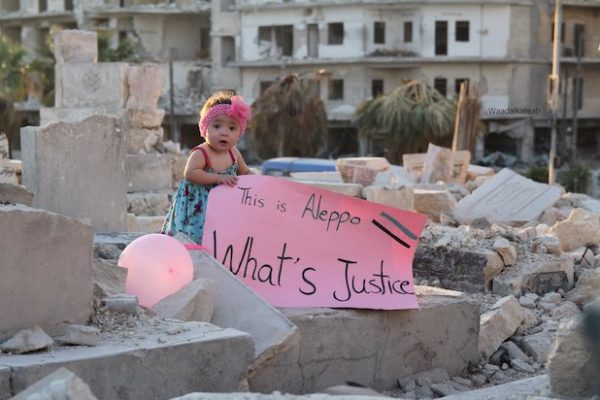We’re used to seeing news dispatches from various war-torn parts of the planet. These are usually presented with the air of anthropological distance, with just enough tragic detail to give a taste of the situation. They’re always filtered through the Western perspective, even if the correspondents are as driven and dedicated as the likes of Marie Colvin, killed in a blast covering the ever-escalating war in Syria. Waad Al-Khateab and Edward Watts’ documentary For Sama deals with the same conflict but from the perspective of those on the terrifying front lines. It’s an exhaustingly immersive, deeply human and heartbreaking work fuelled by hope, love and anguish.
For Sama initially began as a document of the Arab Spring. Waad, then a student at the University of Aleppo, captures the raucous, dizzy optimism in the streets as revellers dance and fireworks burst ebulliently overhead. Before too long, however, it’s another type of ordnance falling from the sky and under months of constant bombardment, the buildings of a once-beautiful city resemble shattered teeth in a pulped face.
Amidst the carnage Waad compulsively documents, she meets a doctor Hamza, who sacrificed his marriage to remain in Aleppo and help those caught up in the siege. Before long, they’ve fallen in love, married, and had a daughter Sama. The film becomes Waad’s diary, love letter, and confessional to her baby.
Little Sama is often seen in the background as Hamza and his fellow staff toil in the most difficult conditions attempting to save a never-ending stream of maimed and broken bodies. The doctors try desperately to stitch together the victims who lie on every available surface in pools of blood and iodine. At the end of a shift, the makeshift wards resemble an abattoir more than a place of healing.
The horror is not just that of flesh and viscera, but the trauma of loss and its ever-present threat. A mother numbly carries off her dead son, shrugging off all offers of assistance. Another bereaved parent screams at Waad to keep filming, furious in her grief. An emergency Caesarean becomes a moment of impossible drama and explosive catharsis.
The narrative flits nervously in its chronology, like a bird flapping in its cage. This unsettles the structure somewhat but is necessary to avoid the film becoming a litany of atrocity and misery. Joy, miraculously, is salvaged from little moments of bonding between families, colleagues, and the wide dark eyes of the adorable Sama. This little bundle of hope adds further depth to the theme of duty and sacrifice the film so unflinchingly explores. Waad and Hamza have to juggle their protective instincts as parents with what they see as their obligations to their country and its citizens, even as the place they love is torn apart by those ostensibly in charge and turned into one vast charnel house.
It’s not just the risk to Sama’s life that concerns, it’s the who-knows-what traumas the little girl is hoarding in her subconscious for the future. Her parents even muse at one point that they can tell she knows what’s going on when they look in her eyes. Somehow, Waad and Hamza have decided that other needs are greater than their own and it is this unfathomable, unaffected heroism that moves the audience as much as the wrenching footage of dead children and grieving families.
Waad has since stated that she has never been moved to pick up her camera since the film’s completion. Even if it’s left to gather dust as a relic of her earlier life (and this extraordinary woman is still in her twenties) she’s made one of the most vital, dramatic and fierce documents of war that you could hope to see. For Sama deserves to be mentioned in the same breath as Alain Resnais‘ Night and Fog, Claude Lanzmann‘s Shoah, and Joshua Oppenheimer‘s The Act of Killing. It’s incredibly tough, but essential viewing.
@Filmhouse, Edinburgh from Fri 20 Sep 2019
